On July 7, 2019, Tsinghua University School of Economics and Management (Tsinghua SEM) held its Commencement 2019 at Gymnasium of Tsinghua University.
Tsinghua SEM Dean BAI Chong-En reported that, during the academic year of 2018-2019, 219 undergraduate students were awarded bachelor degrees, 474 earned second-degrees of undergraduate programs, 1,156 were awarded graduate degrees (including MBA and EMBA degrees), and 56 were awarded PHDs. In total, 1,905 students received their degrees from Tsinghua SEM.
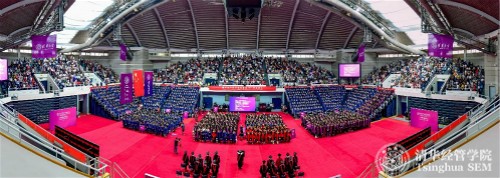
Tsinghua SEM Commencement 2019
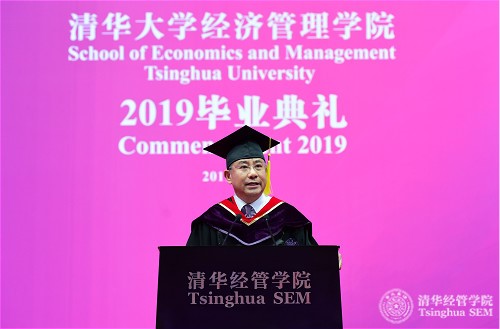
Tsinghua SEM Dean BAI Chong-En
Following on, the student representatives from the nine programs were invited forward to speak about their experiences at Tsinghua SEM, both academically, professionally, and personally. They were JIN Tao (Undergraduate Program), GUO Shuyu (Second-Degree Undergraduate Program), LI Ze (Masters Program), Polina Koroleva (Masters Program), CHEN Dapeng (Ph.D. Program), Anne Victor (Tsinghua-MIT Global MBA Program), LI Lei (MBA Program), LI Jireh (EMBA Tsinghua-INSEAD International Program Dual Degree Program), and XU Tieliang (EMBA Program).
Former Minister of Foreign Trade and Economic Cooperation of the People's Republic of China and Party Secretary SHI Guangsheng delivered the commencement address. In his speech, he first reviewed the changes of China’s foreign trade industry. He pointed out that the reform period took place in two segments. The first segment from 1979 to 2001 was before China had entered the WTO. The state implemented a series of policies such as the decentralization and liberalization of management rights. The second segment came after China entered the WTO, where great developments were made in China’s foreign trade. This is due to a series of reform measures such as creating fair market environments for legal competition, reducing tariffs, eliminating non-tariff measures, and further improving the export tax system.
SHI Guangsheng indicated that reform and opening up of trade has promoted the country’s overall reformation and opening up. Great developments in foreign trade promoted fast development of national economy, which then provided an important base for foreign trade. The future of China shall definitely be even more prosperous.
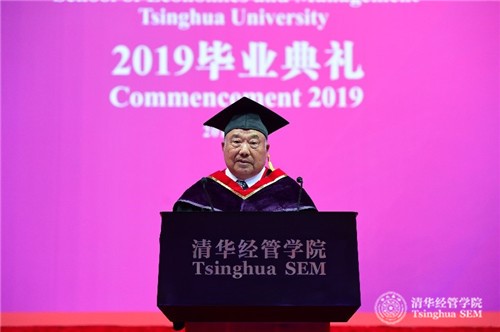
Former Minister of Foreign Trade and Economic Cooperation of the People's Republic of China and Party Secretary SHI Guangsheng
After the commencement, each graduate had the opportunity to take an individual photo with Dean BAI.
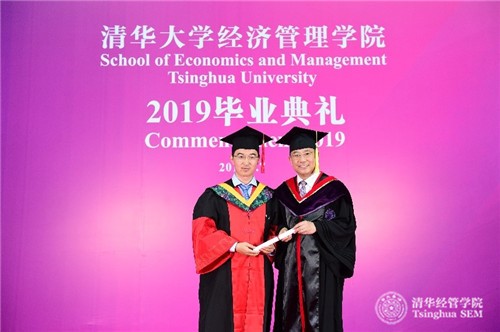
Photo with Dean BAI
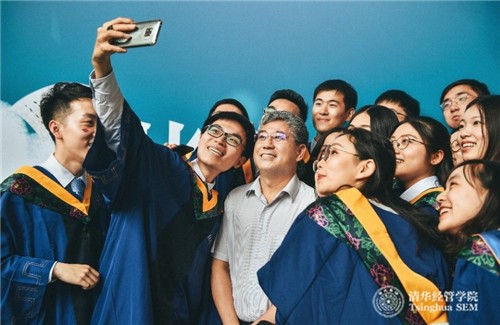
Photo with Dean BAI
Editor’s Notes
The former Minister of Foreign Trade and Economic Cooperation of the People's Republic of China and Party Secretary SHI Guangsheng. SHI Guangsheng graduated from Beijing Institute of Foreign Trade (now known as the University of International Business and Economics, Beijing) in 1965. Over the years, he served as Director of China National Metal Mineral Import and Export Corporation, Deputy General Manager, Special Commissioner of MOFTEC (Ministry of Foreign Trade and Economic Cooperation) in Shanghai, Director of Import and Export Department at MOFTEC, Assistant Minister, and Vice Minister. From 1998 to 2003, he acted as the Minster of Foreign Trade and Economic Cooperation, and as the Party Secretary. In 2004, he was awarded a French Officer Medal of Merit by the French government. In 2007, he was awarded a Pakistan New Moon Medal by the Pakistani government.
SHI Guangsheng witnessed China’s restoration of status in the countries of the General Agreement on Tariffs and Trade, and its 15 long and arduous years upon entering the World Trade Organization (WTO). When the negotiations for China entering the WTO entered its final stages, he (Minister of Foreign Trade and Economic Cooperation at the time) was the Chinese leader of negotiations and organized the final negotiations for China to enter the WTO. He personally participated in the transformation of New China from a small, weak trading country into a large, strong trading power.
 Latest News
Latest News